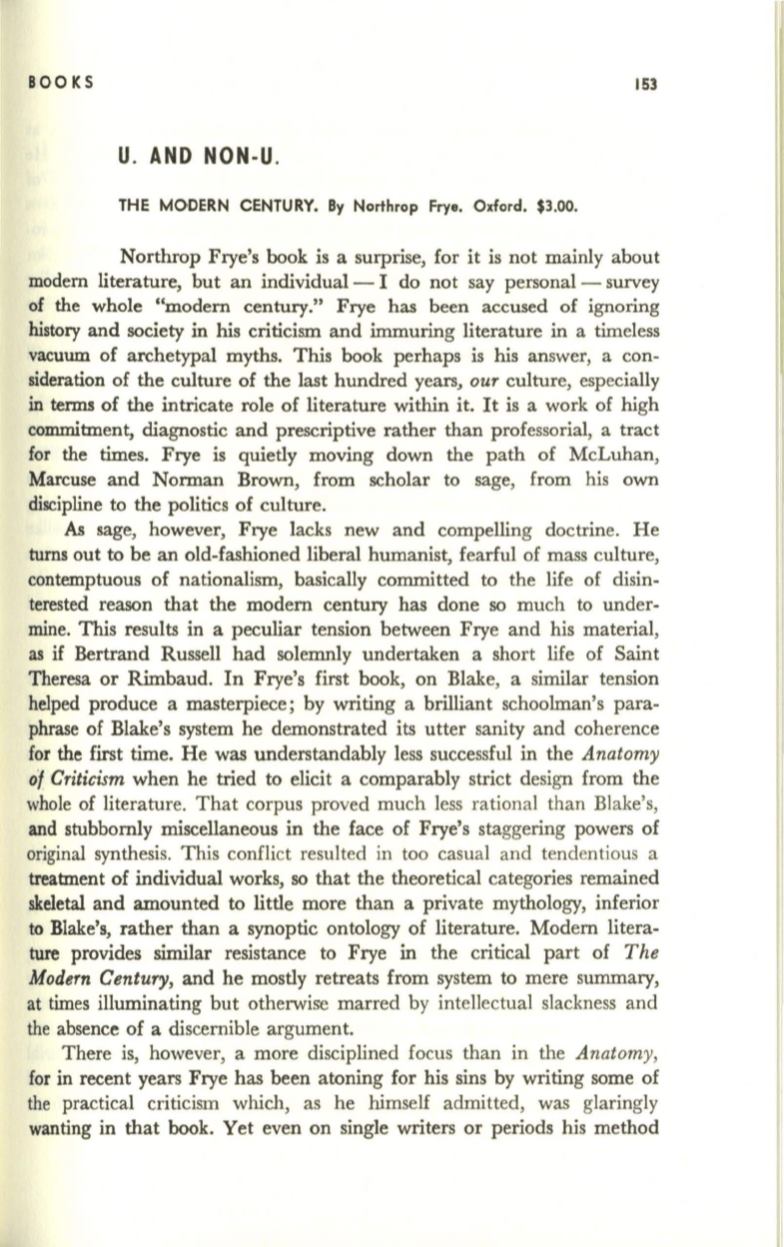
BOOKS
153
U.
AND
NON-U.
THE MODERN CENTURY.
By
Northrop Frye. Oxford. $3.00.
Northrop Frye's book is a surprise, for it is not mainly about
modem literature, but an individual- I do not say personal- survey
of the whole "modern century." Frye has been accused of ignoring
history
and society in his criticism and immuring literature in a timeless
vacuum of archetypal myths. This book perhaps is his answer, a con–
sideration of the culture of the last hundred years,
our
culture, especially
in
terms of the intricate role of literature
within
it. It is a work of high
commitment, diagnostic and prescriptive rather than professorial, a tract
for the times. Frye is quietly moving down the path of McLuhan,
Marcuse and Norman Brown, from scholar to sage, from his own
discipline to the politics of culture.
As
sage, however, Frye lacks new and compelling doctrine. He
turns out to be an old-fashioned liberal humanist, fearful of mass culture,
contemptuous of nationalism, basically committed to the life of disin–
terested reason that the modern century has done so much to under–
mine. This results in a peculiar tension between Frye and his material,
as
if
Bertrand Russell had solemnly undertaken a short life of Saint
Theresa or Rimbaud. In Frye's first book, on Blake, a similar tension
helped produce a masterpiece; by writing a brilliant schoolman's para–
phrase of Blake's system he demonstrated its utter sanity and coherence
for the first time. He was understandably less successful in the
Anatomy
of Criticism
when he tried to elicit a comparably strict design from the
whole of literature. That corpus proved much less rational than Blake's,
and stubbornly miscellaneous in the face of Frye's staggering powers of
original synthesis. This conflict resulted in too casual and tendentious a
treatment of individual works, so that the theoretical categories remained
skeletal and amounted to little more than a private mythology, inferior
to Blake's, rather than a synoptic ontology of literature. Modern litera–
ture
provides similar resistance to Frye in the critical part of
The
Modern Century,
and he mostly retreats from system to mere summary,
at times illuminating but otherwise marred by intellectual slackness and
the absence of a discernible argument.
There is, however, a more disciplined focus than in the
Anatomy,
for in recent years Frye has been atoning for his sins by writing some of
the practical criticism which, as he himself admitted, was glaringly
wanting in that book. Yet even on single writers or periods his method


